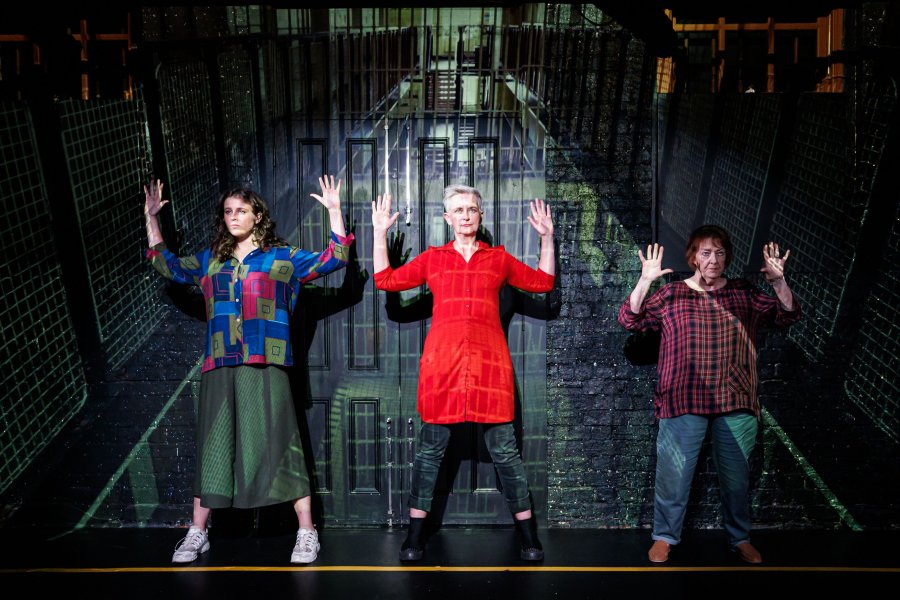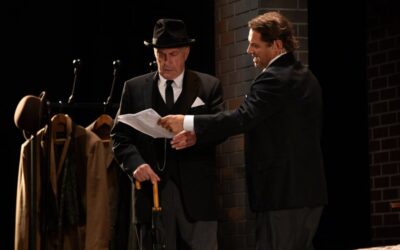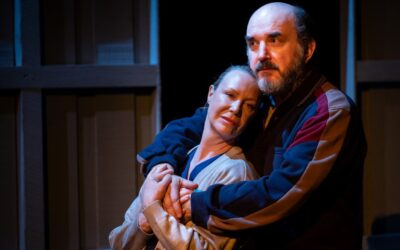By Anna Hayes
The story of Julian Assange is one that dots in and out of our media consumption these days. After seven years in the Ecuadorian Embassy in London, he was arrested in April 2019 and transferred to Belmarsh Prison where he remains while fighting against a potential extradition to the U.S.
He’s in the news at the moment as there is a push to have charges against him dropped – in an unusual twist, both Alexandria Ocasio-Cortez and Marjorie Taylor Greene are singing from the same hymn sheet. Wonders never cease, I guess.
Prisoner at The World’s End, by R. Johns, is an interesting offering – it is the telling of some of the seminal moments of Assange’s life, by three volunteer tea ladies at the prison, as they consider whether he deserves to be prayed for or not.
The women represent three different generations – the baby boomer, the Gen X and the Gen Z, all of whom bring different understanding to the discussions in the play. Interestingly, the boomer (Maureen Hartley) is the one who is keen to pray for Assange which, in a way, knocks a stereotype on its head early on.
The Gen X-er (Joanne Davis) is less enthused by this notion and the Gen Z-er (Romy McIlroy) is fed up of security screenings, little more than a week after starting her volunteering role. The play spans ‘a day in the life’ of the little tearoom, opening and closing with the security screening that they must undergo.
There’s quite a clear undertone – nobody gets in and nobody gets out, unless they’re supposed to.
I’ll be upfront and say that this one caused a lot of debate between my fiancé and I on our tram home. Our initial responses to the play differed quite dramatically – by the time we got home, we both saw each other’s point of view.
It’s for that reason that I think the play really needs to be reviewed as two separate entities – as a piece of narrative art, and as a meditation (perhaps lamentation) on the role of media in today’s socio-political landscape.
That’s quite a bit to pack into 80 minutes of theatre and the result doesn’t quite hit the mark.
The play runs more as a series of vignettes – some more surreal than others – as the three women cycle through Julian Assange’s story, with varying objections from the no-nonsense Gen X who proudly professes that her only love is her cat. Gen Z is hung up on the fact that Assange’s native land is the home of Neighbours.
It’s an interesting juxtaposition – one woman possesses a seeming unwavering support for the man in 23 hours of solitary confinement per day; one is distracted by the shinier piece of information, and; one seems unwilling to discuss the situation at all. I’m not sure if the Gen X character was supposed to be Irish or if the actress just happened to be (it’s never directly stated within the play) but as an Irish person, that avoiding of the issue is very Irish indeed!
It’s one of perhaps the weaker aspects of the play as a play – we learn very little about our three main characters. We learn lots about Julian Assange – probably stuff we didn’t know and the research that went into the writing must have been vast. But if that’s the case, we never see our main, or perhaps central, character on stage. I feel that that’s something of a disservice to the characters we do meet.
Absent characters aren’t a new mechanism – probably the most notable that springs to my mind is Beckett’s Godot, a character we never see (no matter how long we wait) but we learn things about the other characters on stage, insofar as Beckett was prepared to inform, that is.
There are thin elements of character development in Prisoner but, realistically, I don’t think we can say that we know much more about them as they leave, than we did when they were arriving for the day’s shift. There are bread crumbs about Gen Z’s single-parent upbringing, Gen X’s unlucky love life, and the boomer’s dedication to social activism, but not enough to really give us a sense of who these women are.
And that’s a pity because the cast does a great job of depicting the characters as they stand, and all three have the potential, through their own stories, to further contextualise the points the play is trying to make.
But they remain the mechanism through which Johns explores another, admittedly very interesting topic. As a former newspaper journalist, I recognised aspects of Johns’ writing that spoke very truly to my experience in the industry.
There’s a very smart line that Gen X delivers regarding the amount of information Assange released – hundreds of thousands of documents – and she remarks about people having the time or inclination to read it all. This line rang particularly true as it, along with Gen Z’s TikTok attention span, is quite indicative of how we consume news today.
The use of a Rupert Murdoch mask to convey this notion even further was clever as well – while the Murdoch approach didn’t quite start this fire of diluted news and the shortest of shortform content, he probably told us the fire didn’t exist or was just a leftie ploy.
The play certainly succeeds in igniting our cynicism at the world around us – I for one had to suspend no disbelief whatsoever over the line about Maggie Thatcher having tea with Pinochet.
There’s also the striking Mosul monologue from Sepideh Karimi, a stunningly powerful retelling of how Iraq was impacted first by two doses of American “liberation”, before being left to deal with a blood-thirsty ISIS. It is a story of hate and destruction, of losing the essence of a place once called home, and of everything that comes with, essentially, being the weaker side in a fight. It’s an exhilarating cameo from Karimi that is easily the most powerful moment of the play.
Lighting and sound lend well to the actions of the play, perhaps most effectively in the Mosul monologue when we really are drawn into this once bright homely world, diminished to darkness and fear. Projection is also smartly used at pivotal times and helps to draw us into the Belmarsh location.
Good use is made of the external access doors in the theatre, with the double doors helping to provide a striking opening and closing image of the three women under the umbrella looking up at the vast building in front of them – something they could have perhaps used in a projection because the building is enormous.
The cast, under the direction of Elnaz Sheshgelani and Rosemary Johns, did an excellent job with their characters – Maureen Hartley in particular has a wonderfully deadpan delivery that speaks to her disinterest in the frivolities of her colleagues. Joanne Davis’s easy-going demeanour brings great energy to the more physical scenes, as is the case with Romy McIlroy whose physical movement around the stage was surely that of a current or former dancer.
Each character grows with what they are given – the ultimate endpoint being that they all wish, and pray for a miracle and the release of Assange, providing a welcome hopeful ending.
But their limited stories and the socio-political commentary of the piece just don’t weave together in an effective way, which leaves the whole thing feeling a tad disjointed.
Image: Darren Gill





